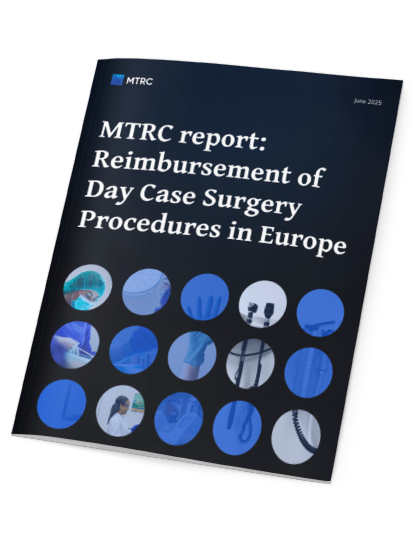
Key topics
There are two key themes describing market access for medical technologies in Switzerland:
- Reimbursement: payment mechanism via DRG system, add-on reimbursement via ZE in hospital settings; payment via TARMED (soon to be replaced by TARDOC) catalog in out-patient settings
- Funding: coverage decisions within the statutory health insurance by the Federal Office of Public Health
There is no health technology assessment challenge in Switzerland. HTA is integrated into funding decision-making.
Switzerland has one innovative payment scheme for medical technologies (Provisional reimbursement of medical procedures).

Reimbursement
Reimbursement for hospital procedures is made solely via the SwissDRG system. All cases of hospitalization with at least one overnight stay are reimbursed via DRG. Day cases and outpatient care are completely separate from hospital care provisions and currently reimbursed via a fee-for-service model using the TARMED catalog. However, in 2026, the TARMED catalog is expected to be replaced by the TARDOC catalog for outpatient procedures and the outpatient flat-rates system for interventions performed in day case settings).
The DRG system has the following components:
Diagnosis-related groups
- DRGs are determined by the combination of a procedure code (CHOP) and a diagnosis code (ICD-10-GM). CHOP nomenclature is maintained by the Federal Statistics Office (BFS/UFS) and released annually
- The base rate is determined nationally, and the Cantons have to approve and adopt it. In case they do not adopt it, the Cantons may set their own base rate (rarely the case)
Add-on reimbursement (Zusatzentgelt, ZE)
- Add-on reimbursement is provided for expensive devices, procedures, and drugs
Tariff is typically determined on the national level by the administrator of the DRG system, SwissDRG
The SwissDRG system is approved annually.
Procedures performed in out-patient and day case settings are reimbursed via a fee-for-service mechanism via the TARMED catalog (soon to be replaced).

Funding
In the inpatient sector, medical devices/procedures are automatically reimbursed according to the so-called “principle of trust” unless they are questioned by a stakeholder of the system (typically insurance companies). In this case, the Federal Office for Public Health (FOPH) evaluates the questioned device/procedure and develops a coverage decision.

Specifics for IVD tests
In-vitro diagnostic tests are reimbursed using a fee-for-service mechanism via the List of Analyses (Annex 3 of the Healthcare Benefit Ordinance, KLV/OPre) in out-patient settings.
Get insights from MTRC free analytical reports
Gain in-depth insights into market access challenges for medical technologies in Switzerland with free MTRC analytical reports and white papers

Explore MTRC research papers:
How can MTRC help?
Development of reimbursement analysis (procedure coding, payment mechanism, reimbursement tariffs, policy and HTA considerations)
Development of market access strategy
Adaptation of the global health economic model to the Swiss settings
Access to an educational seminar on the Swiss reimbursement system
MTRC has experience with more than 159 projects in Switzerland
Get in touch
Contact us to discuss your needs and learn about our services



